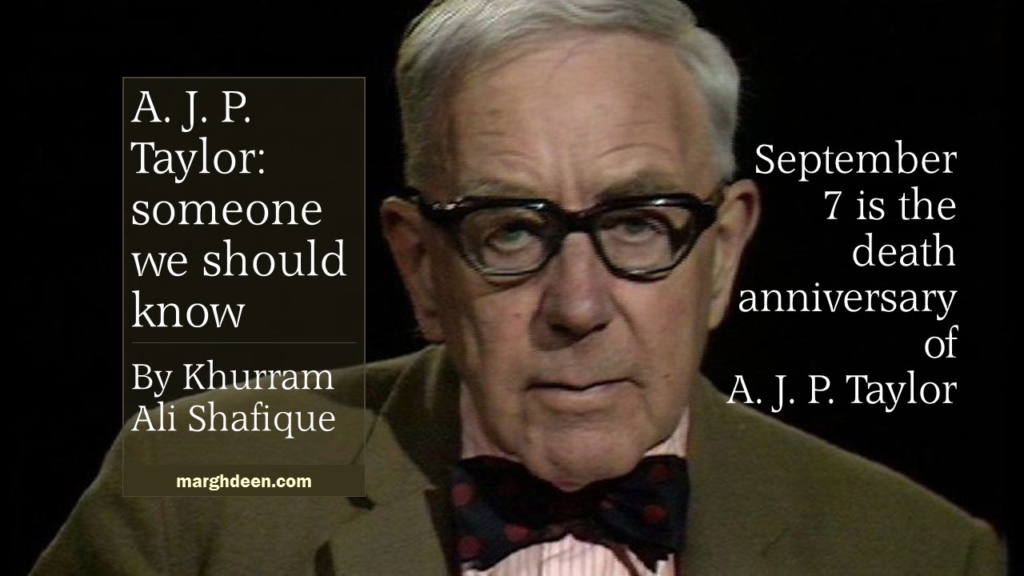Going through the book English History 1914-1945 by A. J. P. Taylor a few years ago, I was happily surprised to see that according to him, the years immediately following the First World War were happy times. This is contrary to the general belief today.
“To judge from all leading writers, the barbarians were breaking in,” Taylor wrote, “The decline and fall of the Roman empire were being repeated. Civilized men could only lament and withdraw, as the writers did to their considerable profit. The writers were almost alone in feeling like this, and it is not easy to understand why they thus cut themselves off.” Such writers, according to Taylor, included T. S. Eliot, James Joyce, D. H. Lawrence, T. E. Lawrence (the ‘Lawrence of Arabia’), Aldous Huxley, Graham Greene, Evelyn Waugh and others.
Taylor believed that these celebrated authors and others failed to reflect the reality of their age. “By any more prosaic standard, this was the best time mankind, or at any rate Englishmen, had known,” he contended.
Coming from possibly the most important British historian of the twentieth century, this statement was very important for me because it corroborated something which Iqbal had written in 1923, i.e. in those very years after the First World War which Taylor was describing some fifty years later (Taylor’s book was published in the early 1970s).
In the preface of The Message of the East, a collection of his Persian poems published in 1923, Iqbal had written that “out of the ashes of civilization and culture Nature is building up in the depths of life a new human being and a new world for him to live in” and described this as a “wonderful revolution which is now taking place in the human mind.” He called it “a great spiritual and cultural revolution.”
Celebrating this great spiritual revolution, still in the making, became a hallmark of not only the poetry of Iqbal but of the best minds of the younger generation of Urdu writers influenced by him. It was epitomized by the poem ‘Abhi Tou Mien Jawan Hoon’ by Hafeez Jallundhri. This development of Urdu literature of the 1920s has usually been ignored but I have tried to highlight it in my book Iqbal: His Life and Our Times (2014).
Iqbal and his disciples were not the only ones to have this belief. Even before the First World War had come to an end, the American thinker Mary Parker Follett had completed writing an entire book decribing the same thing. “New surges of life are pounding at circumference and centre,” she wrote in The New State, “we must open the way for their entrance and onflow.”
The great Bengali visionary, C. R. Das, also appeared to be at the same wavelength in Freedom Through Disobedience (1922) as he said, “We are on the eve of great changes … That which was more or less a matter of Ideal has now come within the range of practical politics.”
Today, when we read such statements – or when we go through the works of Follett, Das, Iqbal, Hafeez or others like them – we get an impression that these writers were too optimistic and not so much realistic. Could it be that those writers were so much more realistic for being optimistic?
In the light of the testimony offered by Taylor, the answer is yes.
This post is a revised (and refined) version of two posts that appeared on my older blog in 2008 as ‘A. J. P. Taylor: someone we should know‘ and ‘Iqbal: a message from the East’.

This can also be interpreted differently if we see World Wars 1 and 2 as a single war with only a break in between for people to catch their breath. And perhaps the trauma of those wars, the “dagger” with which Europe killed herself (which Khurram has discussed previously) then led to the rebirth of a new consciousness, independence of many colonies across the globe (including Hindustan), the formation of the UN, the widespread realization that peace was essential between the nations of the world, all these developments came out of the trauma of the World Wars. Later wars, while still beastly (Korea, Vietnam, Iraq, African civil wars, etc.) were never as widespread, and the Cold War THANKFULLY never actually happened. And perhaps we have this newly born consciousness to thank for that, had the human consciousness been different at the time of the discovery of nuclear weapons we might have used them and created a horror house for us all. So I would say it is was quite significant for Iqbal to say that “a wonderful revolution” was taking place in the human mind, and I think we are in an even better position to appreciate the truth of this statement.
The “roaring twenties” as they have been dubbed was of course a time of reckless wealth…no wonder “they” had won the war against Germany…crushed the caliphate , found oil, …and Europe could be heated and lit….never before they had such luxury.
Yet, Khurram , these were not OUR celebrations….What Iqbal and Follett are saying is the emergence of Russia and communism as a new voice against the Imperialists….. start of a dialogue. IT was a celebration in the sense that a counter argument to colonialism and Imperialism was then possible.
A.P.Taylor was one of the architect of post-war planning of Canada….and was of the same mindset as other beasts who “lamented” about white man’s burden.